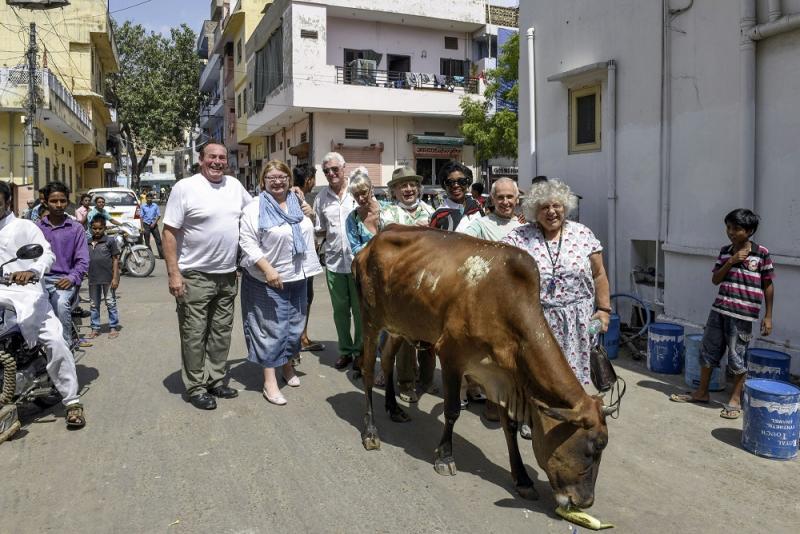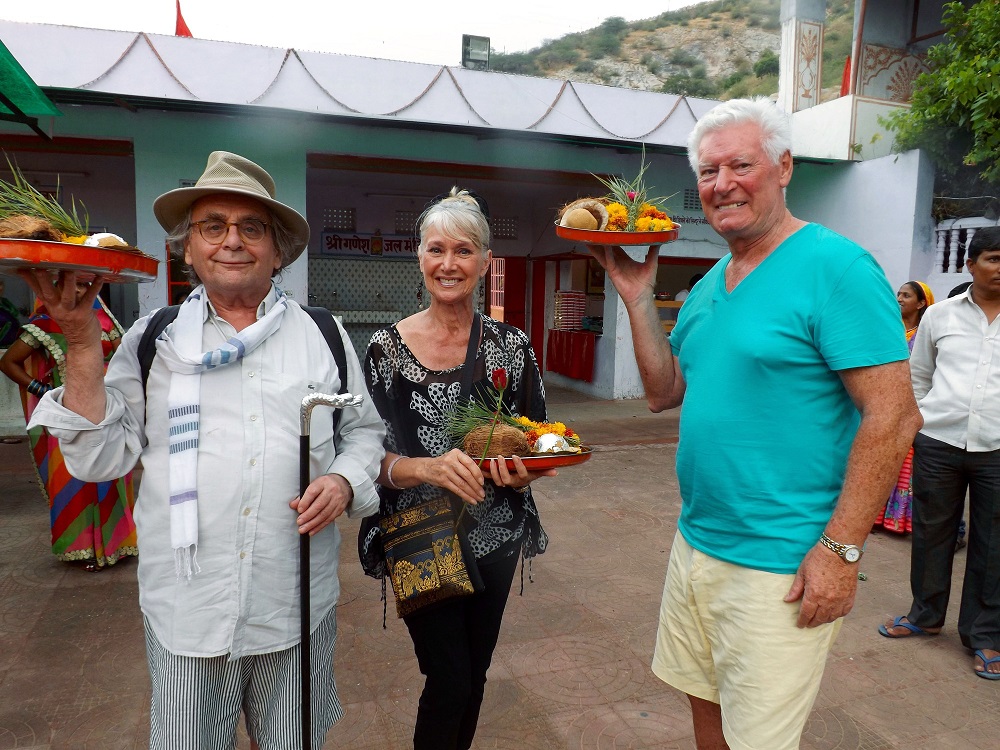The Real Marigold Hotel, BBC Two | reviews, news & interviews
The Real Marigold Hotel, BBC Two
The Real Marigold Hotel, BBC Two
Real-life trial at retirement living in Jaipur curiously disavows past precedents

One novel and two movies, but the BBC cheekily claims that this three-part series was inspired by Deborah Moggach’s 2004 novel These Foolish Things, and the pair of films The Best Exotic Marigold Hotel – but not related. How did the programme-makers come up with this, and keep a straight face?
We have here a contrived documentary, taking eight sexagenerians and septuagenerians, from the delightful and diminutive character ballet dancer Wayne Sleep and the horizontally challenged, formidably intelligent actress Miriam Margolyes, to the singer Patti Boulaye and newscaster Jan Leeming to Jaipur, to stay for three weeks in a central Haveli, to see if retirement on the subcontinent appeals. The voice-over, impeccably spoken by Tom Hollander, had a script which left no commonplace unspoken: India, we were told, was a country bursting with colour and beauty, not to mention year-round warm weather and a low cost of living. Got that?
It was understandably decided to go for staff
We met our cast at Heathrow, with the above joined by the darts champion Bobby George, one-time Dr Who Sylvester McCoy, the chef Rosemary Schrager, and Roy Walker, once a game show host. For one, not all these careers are totally in the past, and we were also given no indication (as we were in the material that inspired but, ahem, is not related to this trilogy, any resemblance to which we must assume purely co-incidental) as to family and economic circumstances.
Why would any of these people consider retiring to India, although the viewer can understand the pleasures of a three-week jaunt to Jaipur, capital of Rajasthan, a noted tourist destination, complete with its own Maharajah, fort, palace and ceremonial elephants. Nor did we discover whether any of our chirpy group had visited the East before: except for that Marigold inspiration, the same kind of contrivance could certainly have been applied, let us say, to Thailand, a country which provides equal advantages of climate, inexpensive staff, and indeed superlative medical services for westerners (or those who can pay).
The pink city of Jaipur has a population of 3.5 million, and millennia of history; our happy troupe has three weeks to get to grips not only with the city, but with India too. Their home away from home, the Khatu Haveli, in central Jaipur, is a three-storey house with an internal courtyard, and in the same family – the Singhs – for 160 years; the matriarch introduced them to the house which needed eight staff a day to function effectively, and told them about the food market. Whereupon our intrepid group decided to try going it alone – for a day, which involved not only shopping for food and cooking but an all-too-intimate acquaintance with a live chicken, killed before their eyes, for their dinner. It was understandably decided to go for staff – defeated not so much by the cooking, but certainly by the heat. It was £20 a week each to have the full complement of staff, £20 a night for en-suite living – not to mention the use of the spacious mansion.
 We were informed, however, that three days into India the visitors still had a lot more to learn about what made the country tick. To this end, they began to delve into hundreds of years of history. A young English-speaking guide, Ravi, took them not only through the magnificent 500-year-old Amer fort, but to the Galtaji temple complete with clever monkey families who stole the group’s plastic bags full of snacks (pictured above: Sylvester McCoy, Jan Leeming, Roy Walker with temple offerings).
We were informed, however, that three days into India the visitors still had a lot more to learn about what made the country tick. To this end, they began to delve into hundreds of years of history. A young English-speaking guide, Ravi, took them not only through the magnificent 500-year-old Amer fort, but to the Galtaji temple complete with clever monkey families who stole the group’s plastic bags full of snacks (pictured above: Sylvester McCoy, Jan Leeming, Roy Walker with temple offerings).
Ravi also told the visitors that he was from a low caste, as our group began to be aware of the hereditary and potentially crippling Indian caste system. He took them all to his own home to meet the family of which he was the only financial support: mother, sister and several nephews and nieces, as well as some goats and a milk-giving buffalo. The family was charming, hospitable, welcoming, and the home certainly humble. His surname evidently made his caste recognisable, so that in spite of his enterprise, intelligence and talent, he did not have access to promotion. Next up, off they go to be entertained to tea by the Maharajah of Jaipur, his Marharanee, and a friend or two, at the Rambagh Palace, now a very grand hotel (with 200 staff) as the kingdoms were nationalised after independence (the Jaipurs have a home in the vast grounds).
We were shown that every home has its shrine or space for worship; Wayne visited a local Hindu shrine, with its Indian guru, and announced that he was on a quest to seek spiritual teaching. Our chef, Rosemary, self-confessedly stressed, visited a guru originally from Europe, now teaching at his own Om Ashram, 20 minutes away from the Haveli: she had a crash course in meditation and claimed almost instant benefit. At the end of the first week they gave a party for the neighbours, getting to know the natives; entertainment included Patti singing and Wayne tap-dancing.
Each of the group in their own way suggested they were falling in love with India, wanted to know more of the culture etc, and were puzzled by the contrast between what they saw as the life, vitality and warmth of the culture and the extremes of poverty they were beginning to glimpse. “I love this place”, they severally declared. What their decisions might be – to retire here or no – will duly be revealed. Meanwhile this curious programme managed to be both patronising to its disparate group from England, several of whom have had glittering careers, and the complex culture and history of Rajasthan.
Even the Indian Tourist Board may not benefit. The programme’s energetically superficial tone of voice underlined the rather maddening pointlessness of making a mockumentary faction out of the fictional Marigold Hotel – even when the only relationship that was claimed was inspirational. Tell me another.
rating
Explore topics
Share this article
Add comment
The future of Arts Journalism
You can stop theartsdesk.com closing!
We urgently need financing to survive. Our fundraising drive has thus far raised £49,000 but we need to reach £100,000 or we will be forced to close. Please contribute here: https://gofund.me/c3f6033d
And if you can forward this information to anyone who might assist, we’d be grateful.

Subscribe to theartsdesk.com
Thank you for continuing to read our work on theartsdesk.com. For unlimited access to every article in its entirety, including our archive of more than 15,000 pieces, we're asking for £5 per month or £40 per year. We feel it's a very good deal, and hope you do too.
To take a subscription now simply click here.
And if you're looking for that extra gift for a friend or family member, why not treat them to a theartsdesk.com gift subscription?
more TV
 Murder Before Evensong, Acorn TV review - death comes to the picturesque village of Champton
The Rev Richard Coles's sleuthing cleric hits the screen
Murder Before Evensong, Acorn TV review - death comes to the picturesque village of Champton
The Rev Richard Coles's sleuthing cleric hits the screen
 Black Rabbit, Netflix review - grime and punishment in New York City
Jude Law and Jason Bateman tread the thin line between love and hate
Black Rabbit, Netflix review - grime and punishment in New York City
Jude Law and Jason Bateman tread the thin line between love and hate
 The Hack, ITV review - plodding anatomy of twin UK scandals
Jack Thorne's skill can't disguise the bagginess of his double-headed material
The Hack, ITV review - plodding anatomy of twin UK scandals
Jack Thorne's skill can't disguise the bagginess of his double-headed material
 Slow Horses, Series 5, Apple TV+ review - terror, trauma and impeccable comic timing
Jackson Lamb's band of MI5 misfits continues to fascinate and amuse
Slow Horses, Series 5, Apple TV+ review - terror, trauma and impeccable comic timing
Jackson Lamb's band of MI5 misfits continues to fascinate and amuse
 Coldwater, ITV1 review - horror and black comedy in the Highlands
Superb cast lights up David Ireland's cunning thriller
Coldwater, ITV1 review - horror and black comedy in the Highlands
Superb cast lights up David Ireland's cunning thriller
 Blu-ray: The Sweeney - Series One
Influential and entertaining 1970s police drama, handsomely restored
Blu-ray: The Sweeney - Series One
Influential and entertaining 1970s police drama, handsomely restored
 I Fought the Law, ITVX review - how an 800-year-old law was challenged and changed
Sheridan Smith's raw performance dominates ITV's new docudrama about injustice
I Fought the Law, ITVX review - how an 800-year-old law was challenged and changed
Sheridan Smith's raw performance dominates ITV's new docudrama about injustice
 The Paper, Sky Max review - a spinoff of the US Office worth waiting 20 years for
Perfectly judged recycling of the original's key elements, with a star turn at its heart
The Paper, Sky Max review - a spinoff of the US Office worth waiting 20 years for
Perfectly judged recycling of the original's key elements, with a star turn at its heart
 The Guest, BBC One review - be careful what you wish for
A terrific Eve Myles stars in addictive Welsh mystery
The Guest, BBC One review - be careful what you wish for
A terrific Eve Myles stars in addictive Welsh mystery
 theartsdesk Q&A: Suranne Jones on 'Hostage', power pants and politics
The star and producer talks about taking on the role of Prime Minister, wearing high heels and living in the public eye
theartsdesk Q&A: Suranne Jones on 'Hostage', power pants and politics
The star and producer talks about taking on the role of Prime Minister, wearing high heels and living in the public eye
 King & Conqueror, BBC One review - not many kicks in 1066
Turgid medieval drama leaves viewers in the dark
King & Conqueror, BBC One review - not many kicks in 1066
Turgid medieval drama leaves viewers in the dark
 Hostage, Netflix review - entente not-too-cordiale
Suranne Jones and Julie Delpy cross swords in confused political drama
Hostage, Netflix review - entente not-too-cordiale
Suranne Jones and Julie Delpy cross swords in confused political drama

Comments
First thing is that the most
The original content is harsh
The original content is harsh and unnecessay, the previous comment undecipherable. The programme had it's faults but the comments offered by the reviewer were cheap shots.